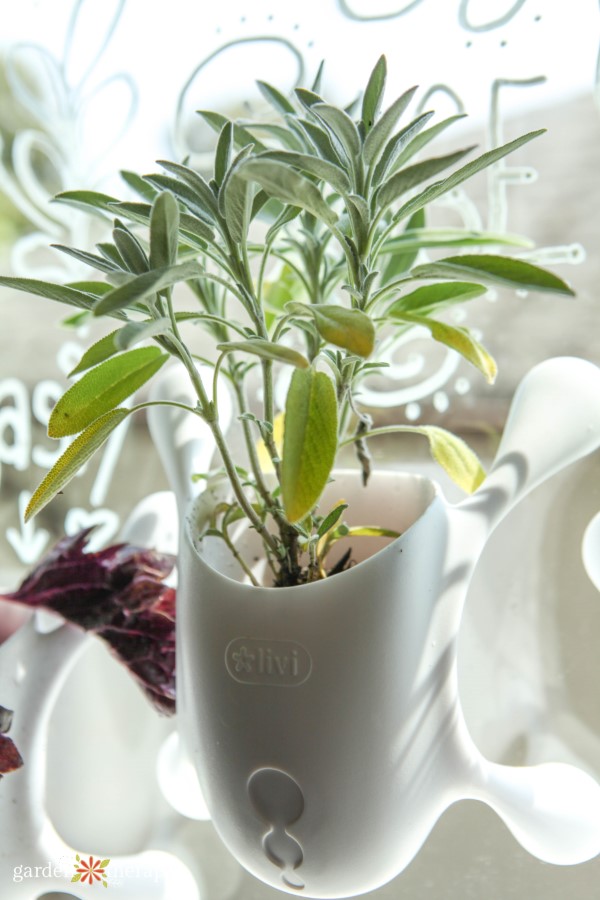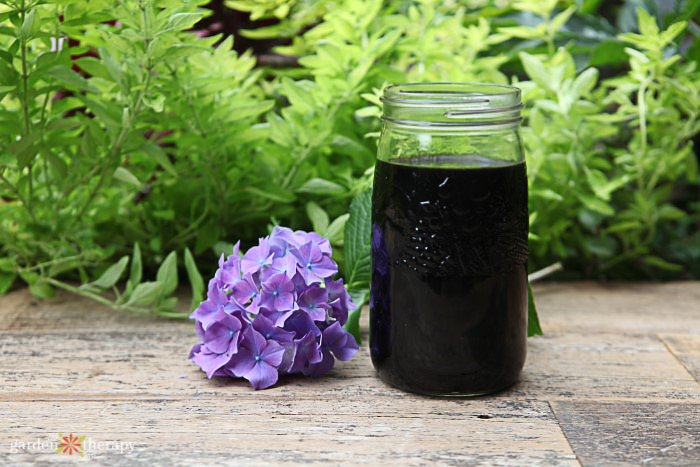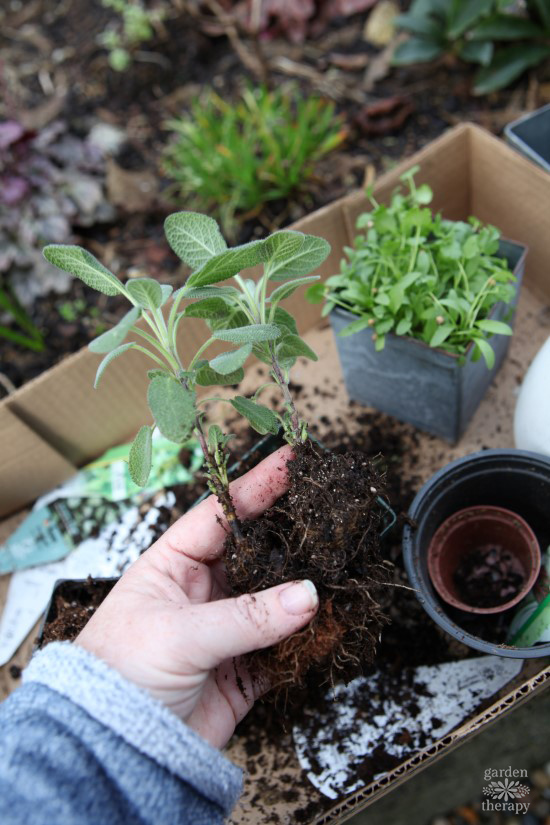A plentiful stock of herbs at your disposal is ideal for the at-home chef, amateur herbalist, or skincare enthusiast. But to get an abundant amount of herbs, it all begins with the soil. Here’s how to get the best soil for herbs using organic ingredients and nutrients!
Pretty soon after I started gardening, I turned to herbs. They’ve been a central part of my garden, as I use them for cooking as well as their herbal and healing properties. You can have so much plant power growing in your backyard!
I get a lot of questions about growing herbs, as more and more people start adding perennial and annual herbs to their gardens and landscapes. So, let’s talk about all things soil.
Whether you’re looking to grow perennial or annual herbs, in the ground or in containers, or outside or indoors, I’ve got all your soil questions answered!
The Best Potting Mix for Growing Healthy Herbs
Growing flavorful, aromatic herbs at home is easy and rewarding with the right potting soil mix. Selecting the ideal potting mix provides herbs with the proper blend of drainage, moisture retention, and nutrients to thrive indoors or outdoors.
When choosing a potting mix for herbs, here are the key considerations:
Drainage
Most herbs prefer a well-draining soil that does not hold excessive moisture. Wet soil can lead to root rot and other problems. A quality potting mix will contain perlite, vermiculite, sand or other amendments to improve drainage.
Moisture Retention
While drainage is important, herbs also need consistent moisture. A good potting mix will retain some moisture so roots do not dry out quickly. Ingredients like coconut coir, peat moss and compost help retain moisture.
NutrientsHerbs need nutrients to produce healthy foliage and flavors, An organic potting mix with compost or slow-release fertilizer provides nutrition without constant feeding
pH Level
Most herbs grow best in slightly acidic to neutral soil with a pH of 6.0-7.0. A balanced potting mix will have an appropriate pH range.
After assessing these factors, here are the top potting mixes for herbs:
FoxFarm Ocean Forest Potting Soil
- Contains earthworm castings, bat guano, crab meal for nutrition
- Mycorrhizal fungi help plants absorb nutrients
- Well-draining and pH balanced
- Suitable for containers and raised beds
Espoma Organic Potting Mix
- Formulated with peat moss, perlite, and vegetable compost
- Contains Espoma’s Holly Tone fertilizer for 3-4 months of nutrients
- Retains moisture well while providing drainage
Miracle-Gro Moisture Control Potting Mix
- Peat moss and coconut coir help regulate moisture
- Perlite improves drainage
- Contains Miracle-Gro plant food
- Resists over and under-watering
Promix HP Mycorrhizae Potting Mix
- Contains coco fiber, peat, perlite, vermiculite
- Added mycorrhizae fungi for nutrient absorption
- Versatile for various herbs and container sizes
Organic Mechanics Potting Soil
- USDA certified organic
- Coconut coir, worm castings, compost, rice hulls
- Excellent water retention
- Suitable for indoor and outdoor containers
When preparing pots for herbs, fill containers with potting mix to about 1 inch below the rim. For easy transplanting, moisten soil before planting and gently loosen roots of plants grown in other containers.
Set plants in soil at the same level they were growing previously. Firm the soil gently and water thoroughly after planting.
To further enrich potting mix, consider adding:
- Worm castings or compost for nutrients
- Perlite or sand to improve drainage
- Time-release fertilizer granules for steady feeding
With the right potting soil and proper watering, herbs will flourish in containers. Monitor moisture levels, fertilize lightly if needed, and harvest herbs often for continual regrowth. Replenish spent potting mix yearly or amend with compost.
Following these tips for choosing the ideal potting mix will lead to a thriving indoor or outdoor herb garden that provides a bounty of flavored leaves for your kitchen.

What’s the Best Potting Soil for Indoor Herbs?
The best soil for indoor herbs will look much different than the herbs you plant in the garden. Indoor plants need a specific potting mix formulated to help them with their extra challenges.
Ideally, the best potting soil for herbs will be lighter and be able to retain lots of moisture since pots quickly dry up. At the same time, it will be well-draining, so no excess water sits.
You can’t just take garden soil and bring it inside. You need sterile soil that won’t have any critters from outside infesting your indoor herb plants.
Most soil ingredients don’t have active biology except for compost. You can sterilize your compost by baking it in the oven at 180°F for 30 minutes. Alternatively, you can buy sterilized compost.
Here is my go-to indoor potting mix:

For all my garden plants, I don’t apply any fertilizer. Really! They already get enough from the ground, and I let my garden naturally decompose in the fall rather than cleaning up all that free organic material. I give them a boost in the spring with compost rather than a fertilizer.
However, plants in containers or indoor plants don’t have the same luxury and may need some fertilizer to boost their nutrients. Do note that too much fertilizer can cause herbs to grow too fast, which may cause a lack of flavour. Too much fertilizer may also burn the roots of the plant.
If you suspect you have poor soil, you can do a soil test to help determine which nutrients are lacking.

Outdoor Herbs in Containers
If you’re planting an outdoor container herb garden, you will want an all-purpose potting mix. It will have more nutrients and be able to retain moisture for potted herbs.
Here is my go-to peat-free potting mix:

Top 5 Best Soil For Herbs Herb Garden Answer
FAQ
What potting soil is best for herbs?
Peat moss, sand, perlite, vermiculite, and some type of organic matter such as compost are the most common choices.
Can you use any potting mix for herbs?
A well-draining potting mix is good for planting herbs at home, like mint and basil. This mix typically consists of loamy soil mixed with perlite or sand to ensure adequate drainage and moisture retention for healthy herb growth.
Is Miracle Grow potting soil good for herbs?
Grow a bountiful harvest with Miracle-Gro® Garden Soil Vegetables and Herbs! Enriched with a blend of compost, plant food and other essential nutrients, it will feed plants for up to 3 months. Plus, Moisture Control technology protects against over and under watering.
What is the best soil for basil and herbs?
For planting herbs like mint and basil at home, well-draining soil is best. A good mix is equal parts potting soil, compost, and perlite or sand. This blend ensures the soil stays moist but doesn’t get waterlogged, preventing root rot. Herbs thrive in slightly acidic to neutral pH soil, around 6.0 to 7.0.
What is the best potting soil for herbs?
Generally speaking the best potting soil for herbs such as basil, mint, and cilantro is good quality multipurpose compost as it retains moisture to prevent wilting yet allows excess water to drain away. Multipurpose compost also has the right balance of nutrients and soil structure to ensure an intense flavor and allow the roots to establish.
How do I choose the right potting mix for my herb garden?
Well, most herbs prefer slightly damp (but not soggy) soil. If the top inch of soil is dry, it’s time to water. Remember, improper watering can have some serious effects on your plants’ health. Next up is pH levels – another thing gardeners often overlook when choosing their potting mix.
What type of potting soil is best for Mediterranean herbs?
A compost and grit potting soil emulates Mediterranean herb’s native soils with good drainage, medium fertility, and an aerated soil structure. A sandy or gritty potting soil mimics the herb’s preferred sandy soils which is crucial to avoid root rot and to ensure your herbs have the best taste and aroma.
Can you plant herbs in potting soil?
Avoid planting herbs in potting soil that has been amended with added nutrients. Avoid soil amendments such as coffee grounds or manure due to their high nitrogen content. Any potting soil amended with a high proportion of sand or grit.
Which potting mix is best for container herb gardening?
Potting mix tends to be the best choice for container herb gardening because, in addition to draining well, it is sterile and often includes added nutrients. Soils and potting mixes are scientifically formulated to include ingredients that can help plants thrive.
What is the best potting mix for plants?
Espoma Organic Potting Mix is another good choice as it contains myco-tone, promoting root growth. Miracle-Gro Nature’s Care Organic & Natural Potting Mix provides moisture control. DIY option: mix equal parts of compost, coarse sand, and peat moss. Add lime if needed to adjust pH. What is Potting Soil and Why is it Important for Herbs?
